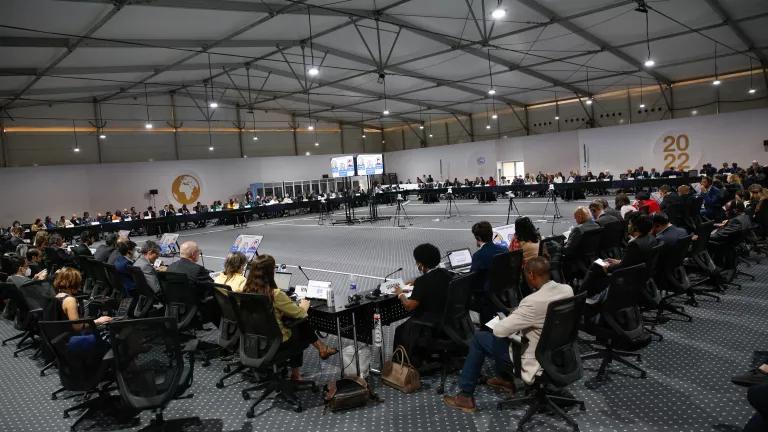How to Clean Up U.S. International Development Finance
Though the Trump Administration is ceding U.S. global climate leadership on numerous fronts, Congress passed a bipartisan bill last year that sets a high environmental standard for U.S. private investment in development projects abroad. The White House must implement the bill this year and adhere to its legislative mandate.
In October 2018, Congress passed and the President signed a bill to create a new U.S. International Development Finance Corporation (USDFC) to provide financing, risk insurance, and equity support for large infrastructure and energy projects overseas. The Better Utilization of Investments Leading to Development (BUILD) Act of 2018 (S.2463/H.R.5105) combines the Overseas Private Investment Corporation (OPIC) with parts of the United States Agency for International Development (USAID) and has budget of $60 billion, more than double OPIC’s $29 billion authority. It will also be allowed to provide direct equity for projects overseas, which OPIC could not do.
Congress passed the BUILD Act to strengthen and increase U.S. international development finance, as a way to respond to China’s Belt and Road Initiative. Among the improvements was a carry-over legislative mandate to implement strong environmental and social policies to guide the new USDFC’s decisions.
A game is afoot to see who can dominate the geopolitics of clean energy in the coming decades. According to a new report issued by the International Renewable Energy Agency, China is currently in a better position.
If the United States really wants to offer cleaner infrastructure financing than China, it needs to do two things:
- the Administration must implement the statutory requirements contained in the BUILD Act and
- Congress must remove an appropriations rider in the federal State and Foreign Operations (SFOPS) account currently blocking it.
OPIC’s strong environmental and social standards are the result of multiple congressional and executive actions over the past several decades. Since its formation in 1971, OPIC’s mission has been to help American businesses invest in emerging markets. In 1985, Congress began requiring OPIC to consider the environmental impacts of its projects. In 2007, because of a 2002 lawsuit filed by several US cities and environmental groups, the Bush administration committed OPIC to track and reduce its emissions. This emissions cap was enhanced and enshrined in the Consolidated Appropriations Act of 2010. In it, OPIC committed to:
- establishing a transparent methodology for greenhouse gas (GHG) accounting,
- reducing the direct emissions associated with OPIC-supported projects in the active portfolio by 30 percent over a ten-year period from the 2008 baseline and by 50 percent over a fifteen-year period from the 2008 baseline,
- shifting emphasis to renewable and energy-efficient projects, and
- establishing an annual emissions cap for all new GHG emissions in OPIC supported projects.
The emissions cap decreased carbon emissions in OPIC’s portfolio by 85 percent (from 50 million tons of CO2-equivalent (CO2e) in 2007 to 8 million tons in 2015). Between 2008 and 2014, the only fossil fuel powered plants OPIC financed were a 100 MW mixed fuel plant in Togo and a 250 MW oil plant in Jordan. Since 2010, OPIC has subsequently updated and strengthened its environmental and social policy statement, most recently in 2017.
Unfortunately, in a step backward, the Consolidated Appropriations Act of 2014 allowed OPIC to finance more fossil fuel projects with language eliminating restrictions on “dirty” investments in low-income countries.
As a result, despite having strengthened its environmental and social policies, OPIC financed four Middle Eastern and African oil and gas projects in 2017 with $810 million in loans and insurance. These projects represent over 2.3 million tons of CO2e per year in emissions. Relative to their countries’ current emissions levels, these fossil fuel projects represent up to 14 percent increases in annual emissions of CO2e in those countries, taking them further off track from being able to meet the goals of the Paris Agreement. And, just weeks after the BUILD Act passed last October, OPIC officials met with leaders from Kosovo to discuss a coal-fired power plant there, even though the World Bank pulled its support for the project based on analysis which showed that renewable power would be cheaper for Kosovo.
It is vital to ensure that the new USDFC adheres to the environmental and social policy standards developed by OPIC over decades. These are policies that should be strengthened, not cast aside in favor of promoting uneconomic fossil fuel projects abroad that are disastrous for our climate.
Though the Trump Administration intends to withdraw the United States from the Paris Agreement, the U.S. should still be committed to financing responsible low-carbon investment overseas.
Policies guiding U.S. international development finance must be improved in line with the recent findings of the IPCC that the world is far off track from keeping global temperature rise below 1.5 degrees Celsius. We must drastically reduce fossil fuel emissions unless we want to be facing even more severe climate-related disasters in the years ahead. The USDFC must support a massive energy transition to low-carbon energy sources. It must not serve to subsidize fossil fuel allies of the current administration in building highly polluting projects abroad.
It is now up to the Trump Administration to implement the BUILD Act and create a new USDFC that adheres to its legislatively mandated environmental and social policies. It delivered its reorganization plan to Congress in March but said little about how OPIC’s environmental and social policies would guide the new USDFC. Congress must do its part too by removing the OPIC rider from its Fiscal Year 2020 State and Foreign Operations (SFOPs) appropriations bills. The House has already done so. We urge the Senate to follow suit.



